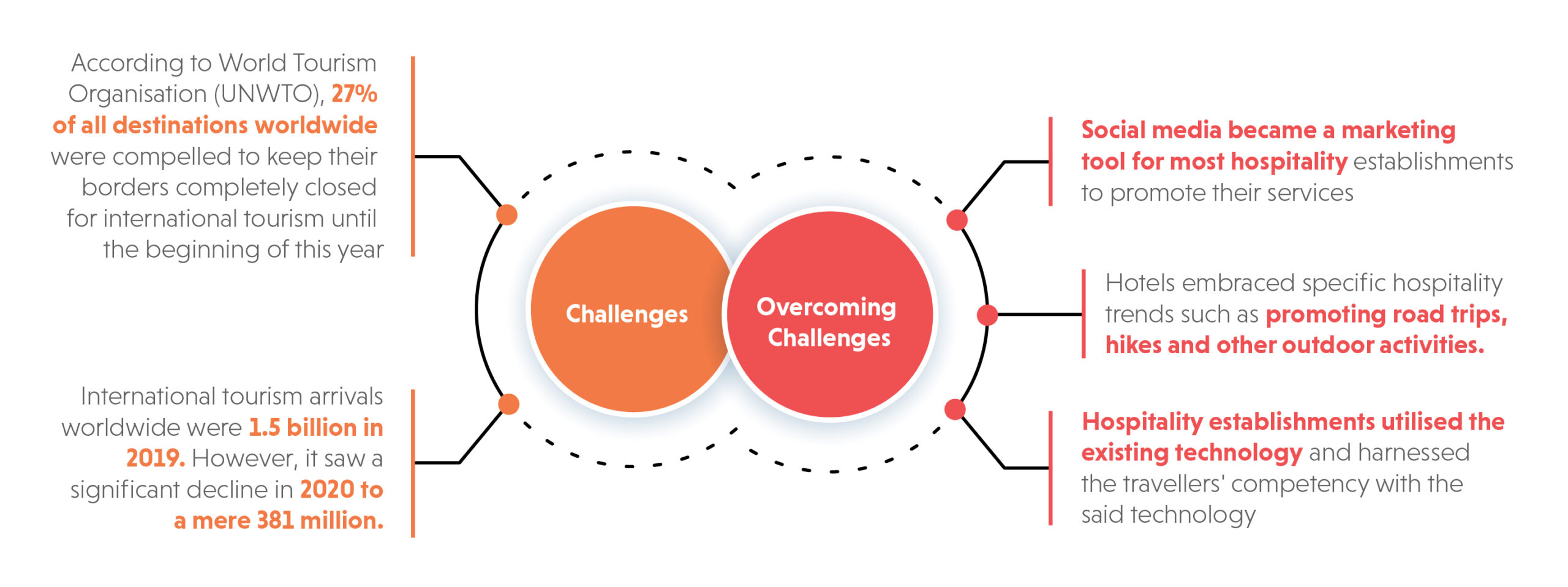Hospitality
Trends 2022
March Issue, 2022
Adapting to post-pandemic trends: overcoming challenges in the hospitality

The impact of Covid-19 in the hospitality industry- challenges, remedies and revival
The hospitality sector globally experienced a remarkable paradigm shift to remain afloat during the troubling times of the Covid- 19 pandemic. The rapid spread of the Covid-19 virus globally, the following travel restrictions, and hotels being converted into quarantine centres fortified what is now known as the ‘New Normal”. Countries around the globe opted for radical decisions. Most tourist attractions, theme parks, restaurants, hotels and other public places are closed. Personal protection protocols were established. Maintaining social distance and wearing masks was mandatory to travel in public. The pandemic debilitated the entire hospitality industry and leisure businesses since early 2020 due to stringent travel restrictions on international travel, thereby forcing hoteliers to explore new avenues to encourage economic growth within the hospitality sector. In fact, according to the World Tourism Organisation (UNWTO), 27% of all destinations worldwide were compelled to keep their borders completely closed for international tourism. International tourism arrivals worldwide were 1.5 billion in 2019. However, it saw a significant decline in 2020, where international tourism arrivals amounted to a mere 381 million.Embracing the New Normal – Creating a pandemic-safe experience
With the introduction of the Covid-19 vaccines and the subsequent boosters, many tourist destinations gradually opened borders within the remit of the WHO Covid-19 protocol. Conversely, the advent of the global pandemic has caused the hospitality sector to take stock of its sorry state and take the risk of shifting from the traditional model of operations to a more digitised one. As a result, the entire travel ecosystem was subjected to change. The travellers’ priorities are now shaped by the pandemic’s imposed health protocols. Thus, most hospitality establishments must upgrade their services to adhere to these protocols and provide stellar guest experiences. The principle element of being at the mercy of digital meant embracing the New Normal and promoting a culture of travel in a pandemic conscious manner.Social Media and Influencers
Social media played a massive role in shaping modern post-pandemic travel tourism. It became a marketing tool for most hospitality establishments to promote their services by promising a temporary break from the pandemic’s social, emotional and physical travails. Human psychology is geared to seek what is familiar, and this is what most hospitality establishments capitalise on. The easy availability of the option for the vaccinated to be lax with their masks during their occupancy in a hotel was enough incentive to travel for the guest who had to adjust to a life dedicated to avoid being infected with Covid-19. Hotels embraced specific hospitality trends such as promoting road trips, hikes and other outdoor activities. Domestic tourism within each region picked up fast and thus increased the need for staycations. Influencers were utilised to promote the hotel establishments in their locality and encourage their followers to explore travel options closer to home. Certain establishments even offered discounts as a marketing tactic for the vaccinated. Social media marketing and, to some degree, performing hotel management tasks via social media made the latter the most common hospitality trend.Digitising Hotel management systems
Yet, despite utilising social media to encourage occupancy and create a smart hotel service, the hospitality sector was compelled to explore the trend of other sectors making a wholesome shift from the pre-pandemic structure of management to a more digitised and technologically smart management system. Many hospitality establishments utilised the existing technology and harnessed the travellers’ competency with the said technology to create a better travel experience with a nod to the New Normal modus operandi concerning hotel management. This is primarily achieved by providing access to amenities and privileges by using a smartphone, the most common and prominent tech gadget. Examples such as providing access to a traveller’s smartphone to function as a hotel key controlling amenities such as a thermostat and even a TV testify to the adaption of the New Normal trend. In fact, hospitality establishments and hotels have developed their own brand apps and installed smart Property Management systems (PMS). Digitisation of services is the most common hospitality trend that remains the prominent marker of the New Normal in a post-pandemic world.Want to know how IDS Next products will benefit your property?
